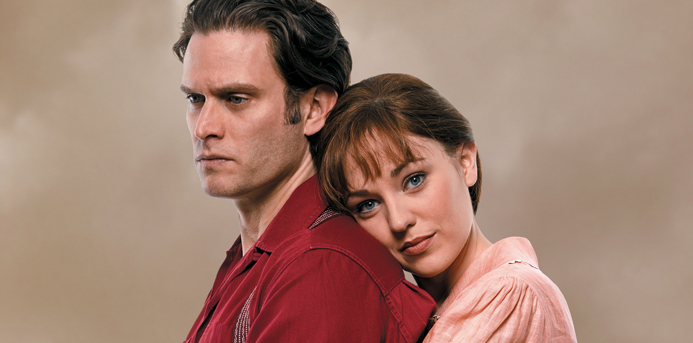From the first notes of “The Carousel Waltz” it is clear that this Rodgers & Hammerstein musical drama will not end happily. Harmonies like shards of glass scrape and slice through the lovely melody as the Lyric Opera of Chicago‘s production of “Carousel” comes to life on stage at the Civic Opera House.
A wordless pantomime is underway. A merry-go-round is alive with lights and carnival folks sparkle, at least on the surface. What rivets us, however, is the shimmering electricity in the music as a girl, plainly dressed, locks eyes with a carousel barker and seals their fates forever.
She is the quiet millworker Julie Jordan, played by Tony Award-winner Laura Osnes in her Lyric debut; he the brash Billy Bigelow, played by Steven Pasquale, also appearing at Lyric for the first time. In their initial duet, the winsome “If I Loved You,” the two establish their mastery of the Broadway song. Osnes begins tentatively, “afraid and shy,” while Pasquale soars to a powerful conclusion, a prelude to his character’s knock-out “Soliloquy,” which was rewarded with sustained applause the evening of April 11.
Beneath their powerful attraction to each other, however, runs a strong strain of nihilism. He sings “… two little people, you and I, we don’t count at all.” Later, as she struggles to live with his bad temper and inability to provide, she sings “What’s the use of wondrin’ if the ending will be sad…” They are as star-crossed as Romeo and Juliet.
Julie’s friend and colleague at the mill is Carrie Pipperidge, portrayed by Jenn Gambatese, who played Maria in Lyric’s staging of “The Sound of Music” last season. Her “You’re a Queer One, Julie Jordan” and exuberant “When I Marry Mr. Snow” shine with vitality.
The most enduring number from the show is “You’ll Never Walk Alone,” sung in this production by mezzo-soprano Denyce Graves, who starred in Lyric’s “Carmen” a while back. At times, her operatic tone did not mesh with the other voices, but in that iconic anthem, it was thrilling.
In Bigelow’s return to earth—he dies during a robbery attempt—he sees his daughter Louise, a troubled girl of 15. Abigail Simon, a Joffrey veteran, captures the agonies and joys of adolescence during an expanded dance number. At one point the carnival people break into her life during a hellish scene reminiscent of the 1948 British film “The Red Shoes.”
That ugliness, however, disappears as Bigelow, whose spirit has been hovering at the back gate of heaven, finds redemption in Julie’s faithful love. The show busts out all over with tunes you can hum: “June,” of course, but also the folksy “Clambake” and the fisherman’s sea shanty, a vigorous song and dance number “Blow High, Blow Low.”
There was one persistent flaw in the production. It was very hard to understand the spoken dialogue the night I attended. The show has some funny lines, but laughter came mainly from the front area in the center section. The actors wore microphones, as does everyone in Broadway musicals now. Were they not articulating properly? Was something wrong with the technology? It was most unfortunate.
The sets are plain and odd. Visual artist Paolo Ventura is making his theatrical debut as set designer, and his work is only partly realistic. An ocean liner, for example, sits on a motionless sea, and palm trees seem to be sheltering the New England folks at their clam bake.
The lavish production features the Lyric Opera Chorus and Orchestra, conducted by David Chase in his Lyric debut. Choreography is by the show’s Tony and Emmy award-winning director Rob Ashford. His dancers are athletes all, and some accomplished acrobats as well.
The original Broadway show, which opened 70 years ago this month, was set in 1873 Maine, but Lyric places it in 1930s Massachusetts. It would be hard to find a more dismal period for women’s fashions than that depression-wracked decade, but the disturbing issue of domestic violence, alas, still rings true.
Just the second in the golden team’s series of Broadway hits, “Carousel” is light years away from their uplifting “Oklahoma!” two years earlier, and miles from subsequent charms of “South Pacific” and the wondrous “King and I.” Whatever prompted Time magazine to call this show the “best musical of the 20th century” is anyone’s guess.
But it’s a familiar tale of love, loss and forgiveness that has found its way into our hearts and Lyric’s production only affixes it further.
Lyric Opera of Chicago presents 20 performances of “Carousel” through May 3 at the Civic Opera House, 20 N. Wacker Drive, Chicago. For information and tickets, call 312-827-5600 or visit Lyric’s website.

